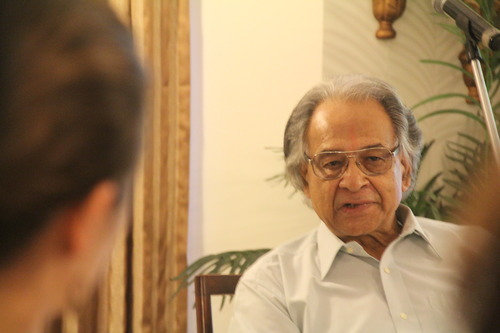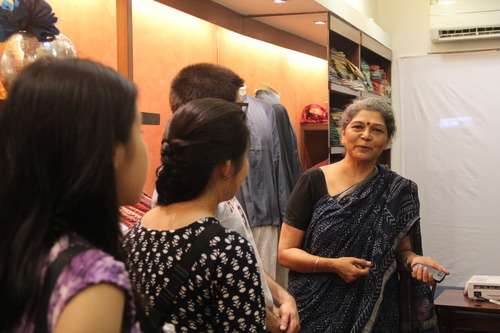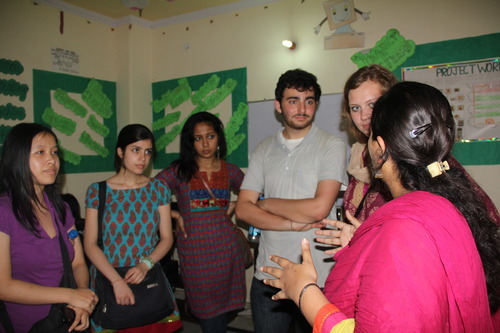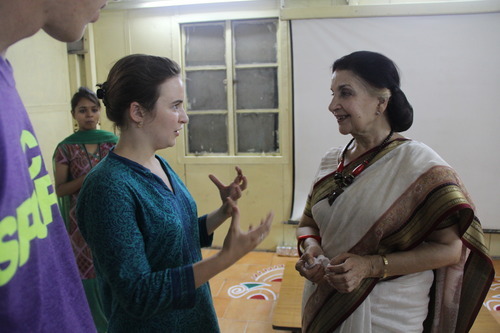The South Asia Institute offered an Immersion Program for SAI grant recipients to get an in-depth look into organizations and NGOs in and around Delhi from July 17 through July 21. The opportunity also allowed students to meet with Harvard alumni as well as other grant recipients.17 Harvard students participated in the program, coming to Delhi from their internships and research sites in Bangalore, Jaipur, Pune, and Gujarat.
A snapshot of the program is below. Find more pictures of the program on our Facebook page.
Day One of SAI’s Immersion Program: Social Enterprise

Today was the first day of the SAI’s first Immersion program – 17 Harvard students have congregated for a chance to get an in-depth look into organizations around Delhi.
For our first visit, we went to Kegg Farms, one of the oldest poultry breeding organizations in India. There we met with Vinod Kapur, Chairman of Kegg Farms, which is best known for its pioneering of genetically breed ‘Kuroilers,’ a type of chicken that will survive in village conditions and produce more eggs than the typical chicken. Kegg Farms sells the Kuroilers to villagers who then make their livelihoods with chickens that will live longer and produce more eggs in their lifetime. They currently serve over a million households in 17 states in India.

Kuroilers have become a tool of poverty elevation, food security, and empowerment for women. The government now uses Kegg Farms model as a major element of programs to reduce poverty in India.
Next, we visited the flagship FabIndia store. FabIndia links over 80,0000 craft based rural producers to modern urban markets, creating a base for skilled, sustainable rural development.
We finished the day at the One Harvard Young Harvard event, an opportunity for the students to meet alums and incoming students.
Day Two of SAI’s Immersion Program: Education

On the second day of SAI’s immersion program, we visited two educational NGOs who both provide unique ways of providing education to the bottom of the pyramid.
The first, Pratham Delhi, provides supplementary classes to school children as well as adult education classes in hub centers across Delhi. We visited two centers in East Delhi.
The hub we visited serves 150 – 200 students, and has classes for boys in the morning and for girls in the afternoon. This is because girls will attend government school in the morning, and boys will attend in the afternoon, as is the policy with the government schools.
Next, we visited Arpana Trust, which provides Montessori Style early childhood education classes for students until they are six years old. They will then go to government school, and Arpana will provide the students with supplemental classes, in addition to their regular schooling. In addition, Arpana also provides skills classes for women, in areas of beauty culture classes, vocational training, tailoring and sewing, as well as career counseling.

We met Sushma Seth, an Indian film and theater star, who directs Arpana’s theater program. Theater, Sushma says, encourages students physically, mentally, and spiritually, and allows them to blossom as human beings.
We were treated by to a few scenes from a new play that the students have written about Kalpana Chawla, the first Indian woman astronaut. The students inspired us with their conference on stage.
To finish the day, we had dinner at the home of Dhruv Agarwala, a 2002 graduate of HBS. Dhruv and his wife treated us to a lovely home cooked meal, and the students were able to share their experiences and impressions of India.
Day Three of SAI’s Immersion Program: Rural Development

On the third day of SAI’s Immersion Program, the group visited Gomla, a small village in Haryana, that has been adopted by the Anant Vikas, an NGO focused on bridging the rural and urban divide. With volunteers from St. Stephen’s College in Delhi, Anant Vikas has created an IT Center, an outdoor theater, a women’s wellness center, and a sports field in Gomla.
Our visit was captured by the Daily Mail and India Today.
Since the adoption of Gomla by Anant Vikas, literacy rates and sex ratios have improved in the village.
The students got a taste of village life, and encountered wonderful hospitality by the local people.
Learn more about Anant Vikas here.
Day Four of SAI’s Immersion Program: Reflections

After spending night in Gomla, the students traveled back to Delhi for the close of the pilot SAI Immersion program, with lunch at the Delhi Golf Club. The students were invited to share their experiences and thoughts about the NGOs, companies, and village we had visited over the past few days.
“I absolutely loved the visit to Haryana. So often in Harvard, the media, or assorted publications, we hear about international development, but I feel that no amount of scholarship can ever replace the chance to see development in action. The villagers were incredibly kind; absolutely magnificent people.”
David Sheynberg, Harvard College Sophomore interning at the Public Health Foundation of India, Delhi
“I have been doing research in the Indian Institute of Science in Bangalore since the beginning of June, and have been very focused on medical healthcare systems in rural and urban India, but no other aspects of India at all. Through this program, I got exposed to issues of entrepreneurial business, education, art, and bridging the rural and urban India. I felt like this allowed me to get a glimpse of different realities in India than the one I have been working on all summer. It was also meeting all the Harvard students in India this summer, hearing their stories, and understanding the work they’ve been doing.”
Richard Saliba, Harvard College Junior conducting research at the Indian Institute of Science, Bangalore
“The fact that the program overlapped with the One Harvard Young Harvard India alumni event was very useful for me. I was able to build several contacts who are key for my thesis research process.”
Paolo Singer, Harvard College Senior conducting thesis research on India’s IT sector
“It was lovely to be able to form friendships with other SAI interns. I’ve had some great conversations over the past five days about the ups and downs of visiting a country as complex as India but ultimately seeing the enthusiasm of the upperclassmen, many of whom have continued to return to India, learn Hindi, and conduct academic research here has encouraged me to further my interest in South Asian Studies.”
Eva Harvey, Harvard College Junior interning at the Public Health Foundation of India, Delhi
“It was wonderful to compare the strategies used by Pratham and Arpana to improve the quality of childhood education, particularly focusing on the education of children who have and are still overcoming hardship. In particular, I was fascinated by Arpana’s emphasis upon including music, theater, and dance in each child’s education experience.”
Rachel Knapp, Harvard College Sophomore volunteering with children with HIV, Jaipur
“The SAI Immersion weekend showed me a side of India that I hadn’t seen in my time here. We were very warmly welcomed by all the NGOs, companies, and groups we visited. Having spent most of my time at a university in India, I didn’t get a chance to see the work that different NGOs and companies did, and they were really great in getting a more holistic view of India.”
Karen Xiao, Harvard College Junior conducting research at the Indian Institute of Science, Bangalore
“My favorite part of the immersion program was spending time in the village and interacting with the villagers, especially the kids. I really enjoyed seeing the everyday lives of villagers as well as the dances they put on for us. Staying overnight in the village was really awesome because we were all able to sleep on one terrace. That was a great bonding time with the other Harvard students…whom I wouldn’t have met otherwise.”
“I absolutely loved having the opportunity to meet and chat with alumni and current graduate students in India. The Harvard Club of India and SAI helped me to make contact with many people who share my interests, with whom I will undoubtedly get in touch back in the US.Visiting elementary education programs in the Delhi slums was an eye-opening and unusual opportunity to come face-to-face with the challenges children face growing up in impoverished parts of India. It also instilled a sense of hope, however, to see the great work that NGOS, like Arpana, have undertaken in this regard.”
Will Lewis, Second Year Harvard Medical School Student conducting research at the Indian Institute of Science, Bangalore
“I really enjoyed the program. When coming to India, I had two main goals in my mind: truly and deeply learning about a new country and the culture of its nation, as well as learning about the solutions India was giving to its challenges (challenges which I also find in my own country, Brazil), and this program was really for both of my goals. It should me a different India from the one I was seeing in my internship and showed the wonderful solutions different people and institutions are offering…In Kegg Farms, I saw an idea that showed me that creating a successful business for the 90% is possible,”
Tabata de Pontes, Harvard College Sophomore interning at Mission Apollo, Pune
